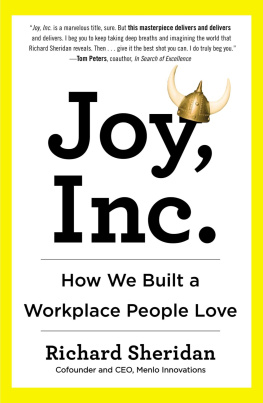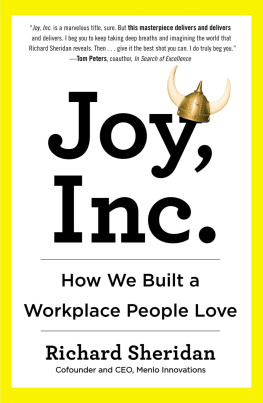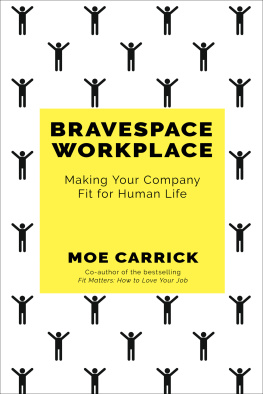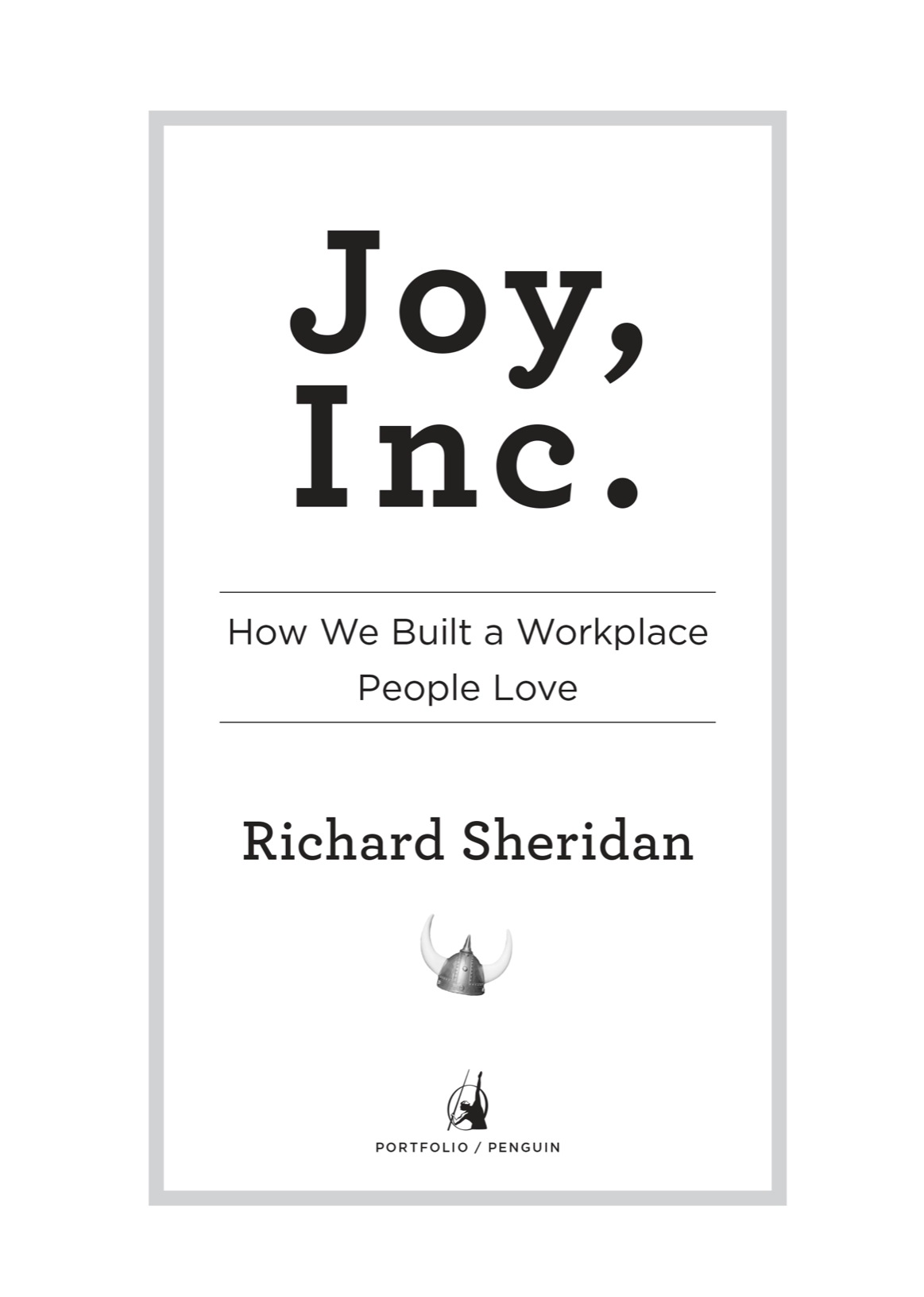Praise for JOY, INC .
Sheridan and his colleagues at Menlo Innovations have created one of the worlds most inspiringand productiveworkplaces, and he reveals its secrets in this highly readable and thought-provoking book. Joy, Inc. is about a way of organizing work so logical, so effective, and so rewarding that you have to wonder why everyone doesnt do it. Maybe now they will.
BO BURLINGHAM , author, Small Giants, and editor at large, Inc magazine
Joy, Inc. is the next step in the evolution of leadership and organization theory. And how appropriate that it comes from Menlo Innovations, the namesake of Edisons invention lab. Sheridan offers not only a manifesto for elevating the soul of organizations but a trail guide from a skilled explorer to help us follow his lead.
JOSEPH GRENNY , coauthor, Influencer
What makes this book such a compelling read is that Sheridan has actually done what he writes aboutachieved joy and the business results that come from itand shows how you can do it, too. Im a busy guy and tried to skim through the pages. That didnt work; its too good. This is an emphatic, dramatic, and pragmatic piece of writing. It deserves your attention, unless joy just isnt your thing.
STAN SLAP , author, Bury My Heart at Conference Room B
An amazing book about a stunning idea. Can you deliberately create a corporate culture that challenges every conventional wisdom on how a workplace should and must operatewhile simultaneously skyrocketing performance? Sheridan says yes and outlines how he and his team he did it. Its a riveting story that left me deeply inspired.
FRANS JOHANSSON , author, The Click Moment, and CEO, The Medici Group
Joy, Inc. is a management book like no other: brilliant, fascinatingly told, and full of memorable and innovative ideas. It has the potential to revolutionize the way we work. Sheridan has proved that a system built around human needs actually works better by any metric you choose to apply, from productivity to profitability to flexibility to sustainability. Thank you, Richard Sheridan, for sharing your riches with us.
JOHN GALL , author, Systemantics, now in its third edition as The Systems Bible
PORTFOLIO / PENGUIN
Published by the Penguin Group
Penguin Group (USA) LLC
375 Hudson Street
New York, New York 10014
USA | Canada | UK | Ireland | Australia | New Zealand | India | South Africa | China
penguin.com
A Penguin Random House Company
First published in the United States of America by Portfolio / Penguin, a member of
Penguin Group (USA) LLC, 2013
This paperback edition with a new preface published 2015
Copyright 2013, 2015 by Richard Sheridan
Penguin supports copyright. Copyright fuels creativity, encourages diverse voices, promotes
free speech, and creates a vibrant culture. Thank you for buying an authorized edition of this
book and for complying with copyright laws by not reproducing, scanning, or distributing
any part of it in any form without permission. You are supporting writers and allowing
Penguin to continue to publish books for every reader.
Photographs courtesy of the author
THE LIBRARY OF CONGRESS HAS CATA LOGED THE HARDCOVER EDITION AS FOLLOWS:
Sheridan, Richard, 1957
Joy, Inc. : how we built a workplace people love / Richard Sheridan.
pages cm
Includes index.
ISBN 978-0-69815-170-3
1. Corporate culture. 2. Work environment. 3. EmployeesAttitudes.
4. Leadership. I. Title.
HD58.7.S523 2013
658.3'14dc23
2013039080
Designed by Elyse Strongin
Version_1
Dedicated with love to
Carol, my pair partner in life,
and our beautiful girls,
Megan, Lauren, and Sarah.
And to James, my pair partner in work and golf.
You all are my joy!
Contents
Acknowledgments and Appreciations
Foreword
R ich Sheridan was close to writing the wrong book.
I stopped him dead in his tracks during the latest stages of his manuscript writing and implored him to change direction.
This wouldnt be a difficult change in what hed already written to that point, but it was profoundly important for what he was going to say to the world.
The book he thought he was writing was Joy, Inc. The book he was almost going to send to the world could have been called Change, Inc.
Perhaps a good book, perhaps an important book, but not this book. Not the book I thought the world needed. Not the book I knewfrom personal experience and from seeing his firmthat Rich was capable of writing. Not the book you all needed to read. Not the book that perhaps only Rich could write. In short, he was not about to write one of the most important business culture books of all time.
I told him it was time to take a stand.
For joy.
Too many business books do the same thing. They equivocate, they hedge, they apologize. They let you, the reader, off the hook and in the process they take away your hopehope that things could be profoundly different than they are right now. This could have been that kind of business book. Quite frankly, I was going to do everything in my power to make sure that didnt happen. If I didnt, the world would be denied a very important messageone it is desperate to hear and needs to hear. Its also a message that Rich Sheridan, through a combination of his wiring, experience, and passion, is uniquely qualified to give you.
You see, when you tantalize readers with the notion of joy, and then tell them how to get there, thats a big promise. Everyone promises to help you change your culture. Weve been writing about it for over three decades. I personally want to be Menlo. I want the joy. I told Rich, I dont think you need to equivocate by suggesting that readers can pick the target they want. That message was unnecessarily tolerant. Crapanyone can pick money, performance, or whatever. But joywhos had the guts to promise that? To be honest, Im sick to death of writers who dont take a stance.
The TV shows I watched as a boy typically opened with the scene of a business-suited father coming home from work at the end of the day, carrying an expensive briefcase and whistling a happy tune. As the inconsequential sitcom plot unfolded, there were no references to Dads actual work back at the office. No writer dared bring down the mood with sordid details about work. Consequently, the message of the fifties was as vague as it was odd. Work was a place that called for a suit and hat and required actions of a mysterious naturethat left employees whistling show tunes at the end of the day.
My own father painted a very different picture of his workplace. We watched our TV from the other side of the tracks. The people in our neighborhood wore thick aprons and gloves at work to keep the gunk, slime, and glue off their clothes. You didnt see Dad or any of our neighbors sporting a fedora any more than you spotted one of them whistling as he came home from work. And most certainly the woman next door, who worked at the fish cannery, didnt skip her way into her doily-adorned living room. After work, she went straight to the kitchen, where she tried her best to wash the stench of fish from her hands.
Given the circumstances on our side of the tracks, people complained endlessly about the backbreaking and mind-numbing nature of their jobs along with the stupidity and pettiness of their bosses. They hated their jobs. Its what they talked about. Its what they told jokes about. Its what they wrote songs about. To paraphrase a line from















